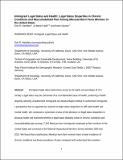Files in this item
Immigrant legal status and health : legal status disparities in chronic conditions and musculoskeletal pain among Mexican-born farm workers in the United States
Item metadata
| dc.contributor.author | Hamilton, Erin | |
| dc.contributor.author | Hale, Jo Mhairi | |
| dc.contributor.author | Savinar, Robin | |
| dc.date.accessioned | 2019-12-05T00:37:00Z | |
| dc.date.available | 2019-12-05T00:37:00Z | |
| dc.date.issued | 2019-02 | |
| dc.identifier | 256752680 | |
| dc.identifier | 1e1888b4-fff0-4a83-9502-48c85610687c | |
| dc.identifier | 85058007610 | |
| dc.identifier | 000457495000001 | |
| dc.identifier.citation | Hamilton , E , Hale , J M & Savinar , R 2019 , ' Immigrant legal status and health : legal status disparities in chronic conditions and musculoskeletal pain among Mexican-born farm workers in the United States ' , Demography , vol. 56 , no. 1 , pp. 1-24 . https://doi.org/10.1007/s13524-018-0746-8 | en |
| dc.identifier.issn | 0070-3370 | |
| dc.identifier.other | ORCID: /0000-0003-1343-3879/work/86538382 | |
| dc.identifier.uri | https://hdl.handle.net/10023/19070 | |
| dc.description | We gratefully acknowledge support from the Western Center for Agricultural Health & Safety, which is funded by National Institute of Occupational Health and Safety Grant No. 2U54OH007550, and from the Max Planck Institute for Demographic Research. | en |
| dc.description.abstract | Immigrant legal status determines access to the rights and privileges of U.S. society. Legal status may be conceived of as a fundamental cause of health, producing a health disparity whereby unauthorized immigrants are disadvantaged relative to authorized immigrants, a perspective that is supported by research on legal status disparities in self-rated health and mental health. We conducted a systematic review of the literature on legal status disparities in physical health and examined whether a legal status disparity exists in chronic conditions and musculoskeletal pain among 17,462 Mexican-born immigrants employed as farm workers in the United States and surveyed in the National Agricultural Workers Survey between 2000 and 2015. We found that unauthorized, Mexican-born farm workers have a lower incidence of chronic conditions and lower prevalence of pain compared with authorized farm workers. Furthermore, we found a legal status gradient in health whereby naturalized U.S. citizens report the worst health, followed by legal permanent residents and unauthorized immigrants. Although inconsistent with fundamental cause theory, our results were robust to alternative specifications and consistent with a small body of existing research on legal status disparities in physical health. Although it is well known that Mexican immigrants have better-than-expected health outcomes given their social disadvantage, we suggest that an epidemiologic paradox may also apply to within-immigrant disparities by legal status. We offer several explanations for the counterintuitive result. | |
| dc.format.extent | 24 | |
| dc.format.extent | 600522 | |
| dc.language.iso | eng | |
| dc.relation.ispartof | Demography | en |
| dc.subject | Health | en |
| dc.subject | Immigration | en |
| dc.subject | Legal status | en |
| dc.subject | Mexico-United States | en |
| dc.subject | Farm workers | en |
| dc.subject | HM Sociology | en |
| dc.subject | 3rd-NDAS | en |
| dc.subject | BDC | en |
| dc.subject | R2C | en |
| dc.subject | SDG 3 - Good Health and Well-being | en |
| dc.subject | SDG 10 - Reduced Inequalities | en |
| dc.subject.lcc | HM | en |
| dc.title | Immigrant legal status and health : legal status disparities in chronic conditions and musculoskeletal pain among Mexican-born farm workers in the United States | en |
| dc.type | Journal article | en |
| dc.contributor.institution | University of St Andrews. School of Geography & Sustainable Development | en |
| dc.identifier.doi | https://doi.org/10.1007/s13524-018-0746-8 | |
| dc.description.status | Peer reviewed | en |
| dc.date.embargoedUntil | 2019-12-05 |
This item appears in the following Collection(s)
Items in the St Andrews Research Repository are protected by copyright, with all rights reserved, unless otherwise indicated.

